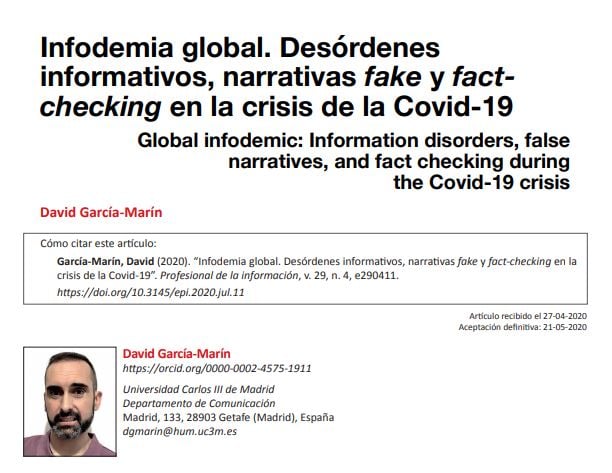
Infodemia global. Desórdenes informativos, narrativas fake y factchecking en la crisis de la Covid-19
On Sale
€10.00
€10.00
Resumen: La Covid-19 no sólo ha desencadenado una pandemia que pone en peligro los sistemas sociales, económicos y sanitarios a nivel global, sino también una infodemia donde proliferan las informaciones falsas, los bulos y las noticias sesgadas. Desde una perspectiva estadístico-descriptiva y utilizando el análisis de contenido, en este estudio se analizan los desórdenes informativos, los lenguajes mediáticos y las narrativas que portan la desinformación generada sobre la Covid-19 a nivel internacional. El objetivo del análisis se centra en determinar las frecuencias de aparición de estas noticias falsas, conocer el tiempo que tardan en ser verificadas y establecer la relación entre la expansión del virus y la prevalencia de la desinformación en los diferentes continentes. Para ello, se analizó una muestra de 582 noticias falsas incluidas en la base de datos sobre el nuevo coronavirus de la International Fact-Checking Network (IFCN). Estas informaciones se dividieron en una muestra general compuesta por 511 piezas y una específica sobre la desinformación compartida a través de WhatsApp (n=71). Los resultados confirman parcialmente recientes estudios que afirman que las informaciones falsas que reconfiguran contenidos verídicos tienen más prevalencia y tardan más en ser verificadas que los contenidos completamente fabricados. La desinformación en formas textuales predomina frente a la producción de imágenes y audios. Los contenidos en vídeo registran tiempos de verificación muy superiores al resto de producciones. La desinformación sobre la Covid-19 integra narrativas con un carácter dinámico y cambiante a medida que la pandemia se expande. Asimismo, se detecta un paralelismo entre la evolución geográfica de la pandemia y la expansión de la infodemia, así como unos patrones desinformativos específicos en WhatsApp, donde se propagan más audios y un mayor porcentaje de contenido completamente falso, en ocasiones con fines delictivos.
Abstract: Covid-19 has triggered not only a pandemic that endangers our social, economic, and health systems but also an infodemic resulting from the prolific spread of fake news, hoaxes, and misleading content. From a statistical-descriptive perspective and using content analysis, this research analyzes the information disorders, media language, and narratives that carry the disinformation generated about Covid-19 at an international level. The analysis focuses on determining its frequency of occurrence, based on the time it takes to be verified and establishing the relationship between the spread of the virus and the prevalence of disinformation on different continents. A sample of 582 fake news items included in the International Fact-Checking Network (IFCN) database on the novel coronavirus was analyzed. This information was divided into a general sample made up of 511 pieces of disinformation and a specific one on fake news spread through WhatsApp (n=71). The results partially confirm recent studies that reported a greater prevalence of information that reconfigures legitimate content and takes longer to be verified than fully fabricated content. Disinformation in textual form predominates over the production of images and audios. Video content required longer verification times in comparison with the other media formats. Disinformation about Covid-19 includes narratives with a dynamic and changing character as the pandemic expands. Likewise, a parallelism between the geographical evolution of the pandemic and the spread of the infodemic is detected, as well as specific disinformation patterns on WhatsApp, where more audio-based disinformation and a higher percentage of fabricated content is shared, sometimes for criminal purposes.
Abstract: Covid-19 has triggered not only a pandemic that endangers our social, economic, and health systems but also an infodemic resulting from the prolific spread of fake news, hoaxes, and misleading content. From a statistical-descriptive perspective and using content analysis, this research analyzes the information disorders, media language, and narratives that carry the disinformation generated about Covid-19 at an international level. The analysis focuses on determining its frequency of occurrence, based on the time it takes to be verified and establishing the relationship between the spread of the virus and the prevalence of disinformation on different continents. A sample of 582 fake news items included in the International Fact-Checking Network (IFCN) database on the novel coronavirus was analyzed. This information was divided into a general sample made up of 511 pieces of disinformation and a specific one on fake news spread through WhatsApp (n=71). The results partially confirm recent studies that reported a greater prevalence of information that reconfigures legitimate content and takes longer to be verified than fully fabricated content. Disinformation in textual form predominates over the production of images and audios. Video content required longer verification times in comparison with the other media formats. Disinformation about Covid-19 includes narratives with a dynamic and changing character as the pandemic expands. Likewise, a parallelism between the geographical evolution of the pandemic and the spread of the infodemic is detected, as well as specific disinformation patterns on WhatsApp, where more audio-based disinformation and a higher percentage of fabricated content is shared, sometimes for criminal purposes.
